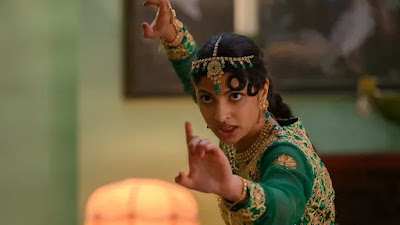The movie (to consider it as a single, pulsing whole) begins in familiar Working Title territory: light, bright and unfolding around comfy West London homes and institutions, only now with a conscious diversity of personnel that illustrates how far the producers have come in the years since 1999's infamously Caucasian Notting Hill. Gradually - slyly, you could say - Manzoor imposes herself. For starters, she makes it both a badge of honour and a neat running gag that heroine Ria (Priya Kansara), an aspirant stuntwoman expected by her family to go more meekly into medicine, flat-out refuses to back or settle down; the dialogue, too, has its own rat-a-tat, idiosyncratic rhythm that may speak to time spent among a large and voluble family unit. Certainly, the onscreen siblings - Ria and Lena (Ritu Arya), the sometime artist Ria seeks to rescue from arranged marriage - bicker and bond like actual sisters, not like actresses who've only just been introduced. It's the same with Ria's immediate friend group - and here Manzoor and casting director Aisha Bywaters reveal a Sturges-like eye for cartoonish fresh faces, funny even before they open their mouths to say anything. Robbie Morrison's editing has been honed on Manzoor's TV work: as in those early Edgar Wright endeavours, sometimes just a cut is enough to get a laugh. ("She's so pretty," says the groom's mother of Lena; cut to Lena at the dinner table, retreating under a hoodie, limp asparagus stalk dangling from downcast lips.) And yet, in several respects, Manzoor pushes way beyond Wright: there's a rowdiness in play throughout Polite Society that surely owes more to South Indian commercial cinema than it does Britcom PLC's trademark cosiness and civility. It's almost always a good sign in a British film when you begin to worry about the integrity of the furnishing; Manzoor's movie gleefully sends masala flying all over the Chesterfields.
That inbuilt whiplash effect - the violent interplay not just between characters and scenes, but tones and genres, too - is further borne out in this script's relatively complicated relationship with its own heroine. Ria is introduced as a scrappy underdog - bested by boys at the dojo, bullies at school - who embarks on her rescue mission with good intentions. Yet she too has fixed and limiting ideas of who and what those around her should be; she's still somewhat out of her depth in the adult world, which is why she feels a need to fortify herself. We're won back around by Kansara's smashing, jumping-bean performance, athletic not just in its relentless physical activity but in the actress's sparkily agitated line readings. Even the Carnatic dance moves Ria busts into as a diversion at the climactic wedding have an edge to them, swan-like only in the sense she could probably snap your arm if you got too close. (Again: it's a relief to encounter a screen presence who hasn't had all the life RADA-ed out of them.) Charging along in the wake of its headstrong protagonist, the film fully slips the shackles of expectation late on, taking a wild imaginative leap so as to justify getting a few more kicks in. Here, I think you can feel Manzoor's control wobble a touch, although it's sort of set up by the heightened property damage no-one mentions for the first couple of reels, and it keeps generating original, funny situations. (Leg-waxing as Bond-like torture, for one.) I've been keeping an eye out for the film that best bottled the heightened, slightly manic energy of mid-to-late 2021, when the world came bounding out of lockdown with renewed purpose, and this may just be it. A spectacular calling card, not least for suggesting multiple directions in which Manzoor might now travel, Polite Society goes beyond the merely feisty, towards goofy, gobby, handsy and stroppy. It's what its slang-slinging heroine would call "really extra" - and an entertainment that was surely almost as much fun to make as it is to watch.
Polite Society is now showing in cinemas nationwide.

No comments:
Post a Comment